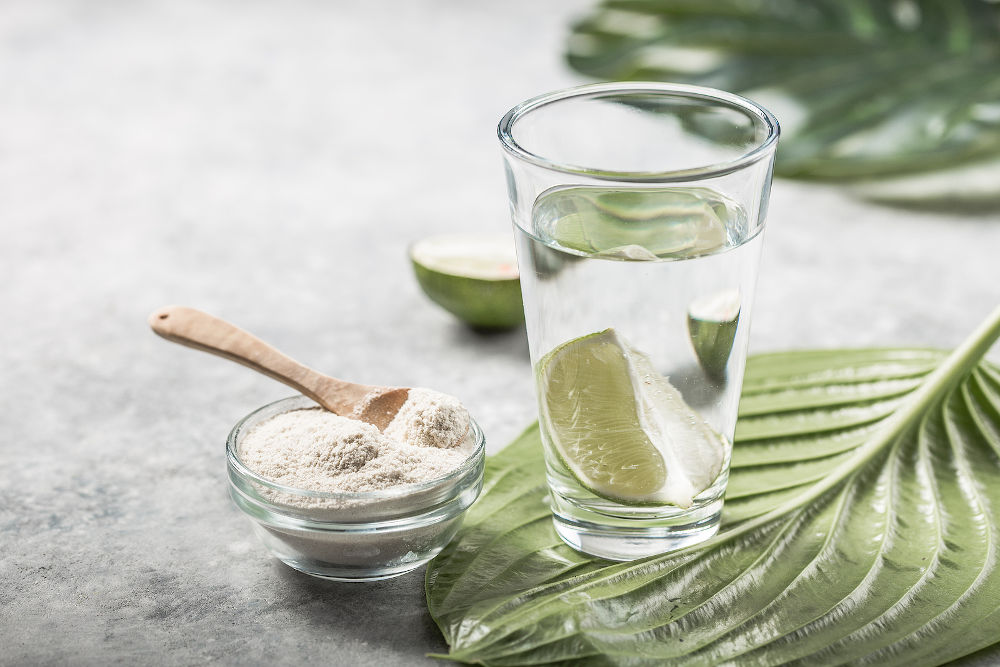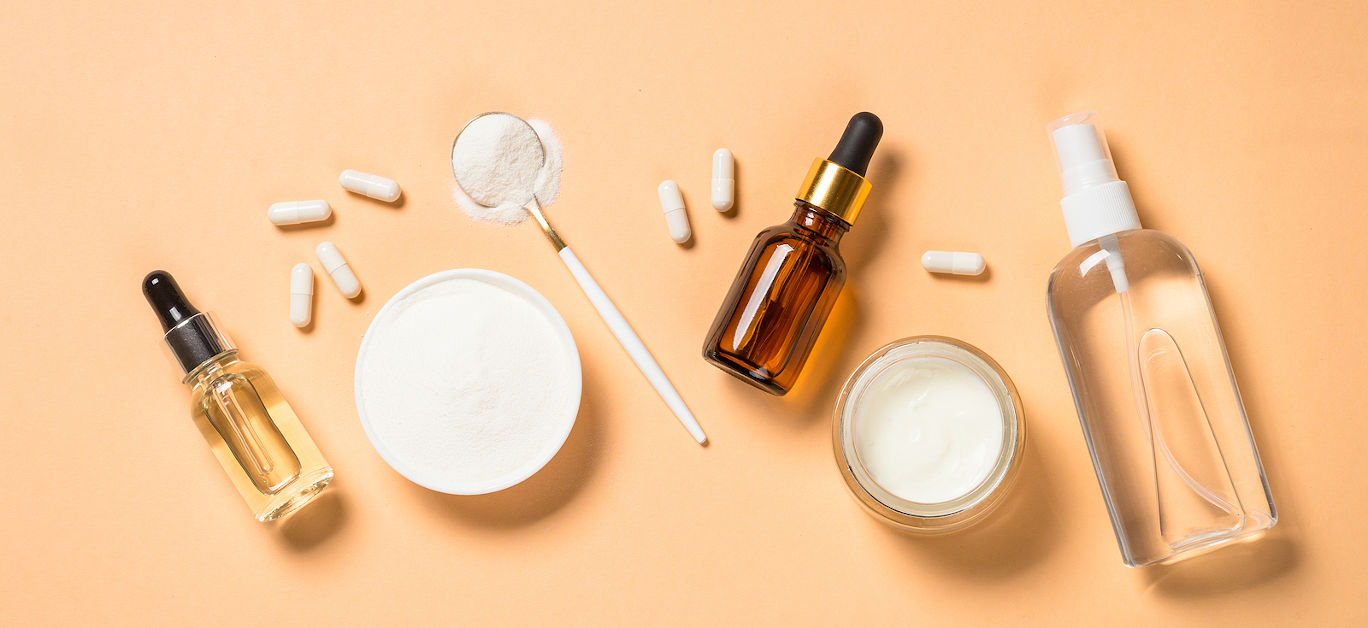From your Instagram feed to your local grocery store, collagen products are everywhere right now. This latest trendy supplement predominantly promises a youthful appearance and with such possibility has therefore cemented itself as the next big product to consume. Aside from this, adding collagen to your diet is said to produce many other health benefits to your body, and coupled with an array of studies and research to prove this, is it easy to see why its popularity is soaring.
You may be wondering why we might need to purchase products containing collagen if we produce our very own and if it really lives up to the hype. We take a look at what collagen is, why we need it and the proposed benefits there are to consuming it in its array of many forms – from powders, tablets and capsules to milks, gummies and liquid shots.
What is collagen?
Collagen is a structural protein that connects muscles, tendons and ligaments together and it gives skin its elasticity and structure as well as being the basis for strong, healthy bones. The bodies of all animals and humans contain collagen, it is the most found protein in our body, making up a third of the overall amount and acts as our building blocks to bind tissue. There are five types of collagen, which make up various parts of our bodies and the protein is also found in our blood vessels, corneas, and teeth and helps our hair and nails grow and our muscles stronger.

Amino acids such as glycine, arginine and proline hydroxyproline are all present in collagen, many of which can be found in supplement form and in a selection of high protein foods, including bone broth. Head to jarmino.co.uk to learn about different bone broth products that can supply you with collagen.
Why do you need extra collagen?
So, if our bodies produce such a large amount of collagen, why do we need to supplement it? It is in fact this very reason that we need to look elsewhere for our collagen supply, with such a large amount needed for such important features of our bodies, it is worrying to learn that at just the age of 25, our collagen production naturally starts to slow with each year that passes seeing a 1% per cent loss on average. Collagen levels can be reduced even further by smoking, consuming excessive sugar and from ultraviolet light from the sun, and the little amount that is produced ends up being of poor quality, resulting in wrinkling skin, loosened muscle and impacts to the agility and functionality of our bodies.
How collagen supplements or collagen intake works
Given that a third of our proteins are made of collagen, it is ever more important to start consuming this to ensure you stay as healthy as can be. You should stick to the same ratio as what is naturally produced, therefore one third of your protein intake should include collagen. It is important to note that plant-based collagen does not affect our body’s natural collagen production, as it cannot contain natural collagen.
It is also crucial to understand that collagen supplements don’t act as a direct replacement. The real function of a collagen supplement is to help your body grow more collagen, so it doesn’t actively take part in muscle or tissue-building, instead it helps to create a building block that produces collagen.

As mentioned above, animal skin and bone are rich in collagen, however we barely incorporate these into our diets, therefore bone broths or stocks are excellent options to get the most out of collagen from natural sources. If you are reluctant to consume it in this way, you can try flavoured collagen peptide supplements. Collagen supplements have the same amino acid formation as natural collagen and our bodies easily absorb them. Powder-based collagen supplements are the most popular as you can easily add them to your smoothies and other beverages.
What are the benefits of collagen?
As collagen is found in connective tissues that build pretty much every part of our bodies – bones, skin, tendons, arterial walls and the like – it goes without saying that we are likely to benefit from an extra boost of the protein in a big way. From nail health to joint, bone and benefits to the liver, there are many reported advantages of upping your collagen intake with studies to support the validity of the claims having been published.
Here, we take a look at some of the some of the key benefits of collagen intake.
Improvement in skin health
Almost 80% of our skin is made of collagen, with the addition of elastin supporting its supple nature, therefore a shortage can lead to dry or drooping skin. Studies have indicated that regular collagen supplements can reduce wrinkles and dryness of the skin. In one study by skin pharmacology and physiology, it was found that taking only 2.5 grams of collagen for eight weeks resulted in improved skin elasticity and reduced skin dryness.

Reduces joint pain
As we age, the cartilage in our joints degenerates from overuse, sometimes causing further issues such as degenerative disorders like osteoarthritis. In addition to this, joint pain can be triggered by inflammation, and inflammation can deplete proteoglycan, a protein responsible for providing hydration and enabling the joint to withstand pressure.
Proteoglycan depletion means your joints can not heal themselves properly, and taking collagen supplements are said to help with joint pain, lowering inflammation, and better protecting your joints. A study suggested, taking 2 grams of collagen for seventy days can significantly reduce joint pain in people who have severe joint pain. It was also found that people administered with collagen experienced improved physical activity.
Prevents bone loss
All bones lose mass with age, making them brittle and more prone to fracture, and with depleted collagen levels it makes it more difficult to recover from such injury. One study into bone density in postmenopausal women with osteopenia (menopause can contribute to an increased risk of osteoporosis) suggested that combining 5 grams of collagen supplements with a regular calcium supplement can reduce bone depletion.
Promotes faster muscle recovery
After extreme physical exercise, muscles becomes sore and they need time to recover from the workout. Collagen is the key factor in faster muscle recovery, regeneration of muscle fibre, and connective scar tissue production according to a study, which said supplementing collagen peptide significantly influences muscle soreness and recovery after you take part in strenuous physical activity.

Promotes liver health
Collagen consists of three amino acids – proline, glycine, and hydroxyproline. The amino acids of collagen are vital for our liver health, especially for those who are on a low-carb and high-fat diet. Glycine, which is one of the amino acids that form collagen, is essential for bile formation – the product that helps you emulsify or break down fats. If you don’t have enough bile salt, your stomach will have a hard time processing food, therefore collagen depletion or glycine depletion can ultimately result in a weakened fat digestion system. Glycine is also essential for reducing liver inflammation, especially the inflammation caused by overconsumption of alcohol.
Boosts muscle mass
Collagen is responsible for better muscle function and strength, however, age can reduce or weaken your muscle mass, a condition known as Sarcopenia. Studies suggest that taking collagen supplements regularly along with regular exercise can increase muscle mass formation, while the supplement also helps to combine creatine, which helps to facilitate muscle growth in our body.
Improves heart health
Type 1 collagen is the most dominant protein (70%) that structures our arterial wall. Arteries carry blood from your heart to your whole body and to complete that function, they need to be strong and supple enough to withhold blood pressure. A lack of collagen has the potential to make your arteries weak and frail, potentially resulting in heart disease. Research suggests that taking collagen supplements can reduce the stiffness of arteries while boosting the production of good cholesterol, reducing the risk of such heart conditions.






















